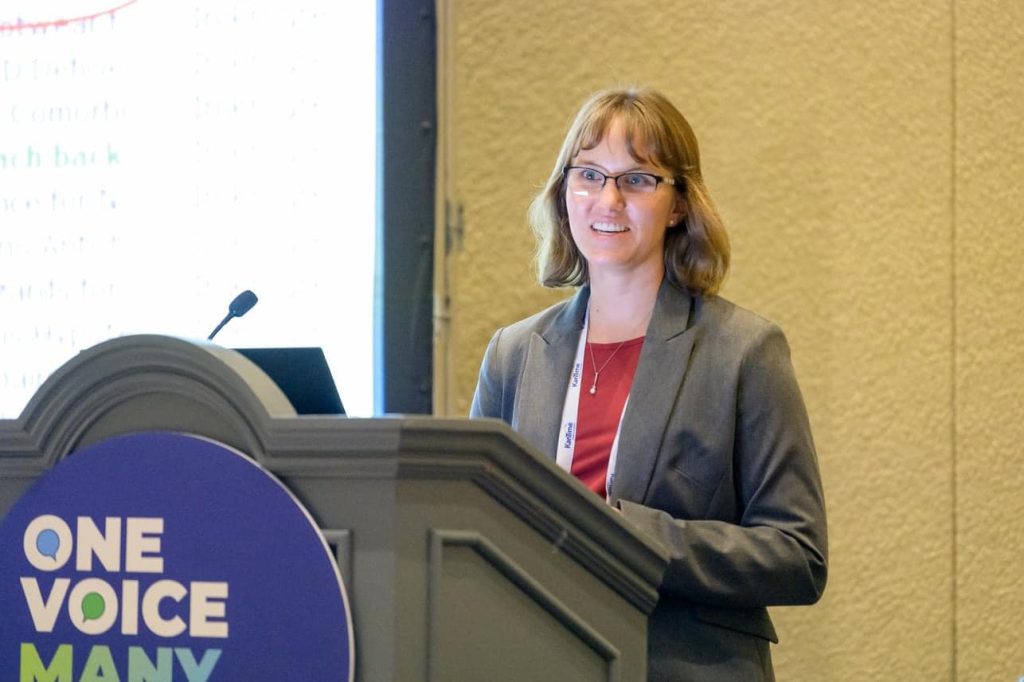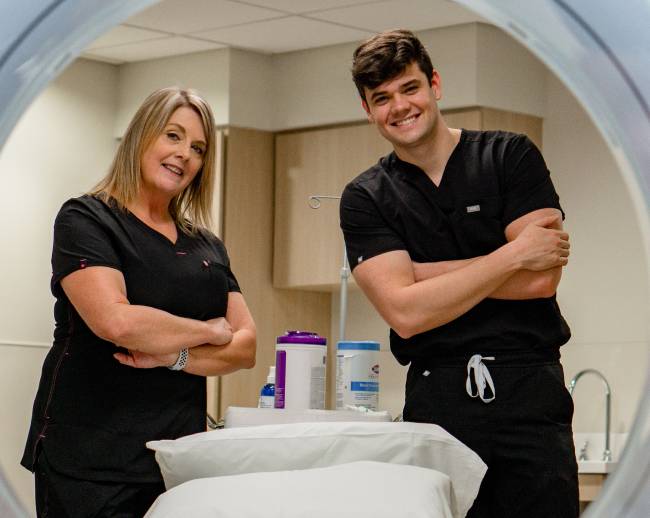
Ciera Whitmore is a wife and mother of two. She balances her career as an occupational therapist (OT) with helping on the family farm and running their local store, Whitmore Farms Market in Coyle, OK. These roles take up most of her time and are incredibly fulfilling. Yet, passion has propelled her to add advocate, fundraiser, and national speaker to the list as she fights for the vocation she loves.
Whitmore knew she wanted to be a therapist from a young age when her sister, Karli, suffered an accident and spent two weeks on life support in the critical care unit. It was during this time that her eyes were opened to the caregivers surrounding patients in their journey back to health. Karli passed away, but the impact she made on Whitmore’s life remains. She now tells her patients that her darkest moment prepared her to help them through theirs.
In 2014, Whitmore graduated with her master’s in occupational therapy from the University of Oklahoma Health Sciences Center and began working for Stillwater Medical Home Health. As an OT, she focuses on helping patients perform everyday tasks. That can include basic things like bathing and getting dressed or managing medications and getting back to the roles they love – whatever the patient needs. Whitmore customizes each plan based on the patient’s unique needs and desires.
“I work with patients to get back to the daily tasks they love. That’s what occupational therapy is all about. For some, that might be driving a tractor, crocheting, or taking daily trips to the senior citizens’ center. It varies from patient to patient, but it’s all about getting them back to the things that give them meaning in life,” Whitmore said.
OT as a profession has been around since 1915. It focuses on a holistic approach to health care, engaging the body, mind, and spirit in the process of healing. However, it is not currently a qualified service through Medicare within home health. So, if a patient only needs OT, they do not qualify for home health. Whitmore is able to serve home health patients who’ve qualified in other ways, working directly with physical therapists and skilled nurses to provide holistic care to patients.
When Medicare and Medicaid were initially created back in 1965, OT was not a licensed profession. That has changed over time and OT is now licensed in all 50 states, yet, Medicare only recognizes OT as a continuing qualifying service once someone has already qualified for home health through other means.
“I am directly impacted when our nursing staff is at maximum capacity. We can’t utilize our full resources of personnel due to OT not being a qualifying service. I want every patient who needs care to be able to get it. That’s when I started looking into what I could do to change this situation,” Whitmore said.
In January 2022, Medicare regulations changed and OT’s could become qualified to perform the Outcome and Assessment Information Set (OASIS) for therapy-only patients at the start of home health treatment. Whitmore completed certification to deliver OASIS testing and, during the process, became the Oklahoma representative for the American Occupational Therapy Association (AOTA). As part of the AOTA political action committee, she has raised funds and contacted legislators at the state and national levels to change Medicare restrictions, giving patients greater access to needed therapy. She’s also spoken at the National Association of Home Care and published articles to advocate for the role of OT in home health.
“Within a four-month period, all of these things were happening, and somehow, I have become a voice in advocating for the profession. My motivation is twofold trying to keep OT relevant under the current system while still fighting to become a qualifying service,” Whitmore said. “It took a decade to pass the most recent bill that gave OT the right to assess start-of-treatment, and I don’t expect we’ll see the current house bill on the floor until 2025 or 2026.”
It’s a long haul that Whitmore is hopeful will end in success, so patients have affordable access to the treatment they need. The Medicare Home Health Accessibility Act (H.R 7148), sponsored by Rep. Lloyd Smucker, is one Whitmore supports because it would make OT a qualified service, emphasizing the crucial role of occupational therapy in preventing rehospitalizations and helping people to remain and thrive in their homes.
Stillwater Medical Home Health partners with both families and physicians to care for the patient’s best interest. The team of physical therapists, occupational therapists, speech therapists, and specially trained nurses work together to provide the support patients need to transition through a difficult time and get back to a normal lifestyle.
“If you are having trouble staying in your home, there are resources,” Whitmore said. “Ask your physician for help and see if home health is right for you. We’re here so we can help people stay safely in their homes for as long as possible.”






